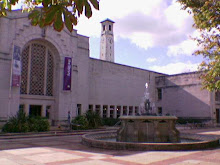We did not have a specific topic for this month, but the proximity of Remembrance Sunday seemed to permeate the free choice poems. We began with Wilfred Owen’s rivetting account of the effects of battle on land and individual alike in ‘The Show’. This divided opinions between those who disliked the intensity of the vocabulary of horror, and those who saw it as showing ‘decorum’ in the old sense of fitting the language to the topic. Keith Douglas’s light but intense ‘Canoe’ continued the theme of soldiers contemplating their fate. He died at Normandy aged 24. Modest to look at, this poem is more complex than it seems. Alun Lewis’s ‘All Day It Has Rained’, reflected the tedium of waiting for action in camp in England. Its emphasis on the cheerful companionship in idleness in bucolic (if wet) surrounding, was applauded, as was the stark contrast of its ending. It was particularly significant for us as it mentions other places in Hampshire.
A change of topic and pace came in the form of A.S.J. Tessimond’s ‘Black Monday Lovesong’. And Wendy Cope’s inventive ‘The Lavatory Attendant’ was well received. James Elroy Flecker’s ‘To a Poet a Thousand years Hence’ gave a charming sense of ‘handing on the baton’ of poetry, while Ben Jonson’s ‘To My Old Faithful Servant …’ records Jonson’s commendation to his servant, and perhaps apprentice, the playwright Richard Brome. Frank O’Hara’s ‘Ave Maria’ continued and extended the sense of witty comment, but we returned to a more thoughtful mood with John Donne’s ‘A Hymn to Christ, at the Authors Last Going Into Germany’. It is a meditation on death replete with Donne’s grief and uncertainty, it was also the poem used to dedicate our session to our late and much missed friend and colleague Brigitte.
Our topic for next time – is N – and the theme is all things nautical.
A change of topic and pace came in the form of A.S.J. Tessimond’s ‘Black Monday Lovesong’. And Wendy Cope’s inventive ‘The Lavatory Attendant’ was well received. James Elroy Flecker’s ‘To a Poet a Thousand years Hence’ gave a charming sense of ‘handing on the baton’ of poetry, while Ben Jonson’s ‘To My Old Faithful Servant …’ records Jonson’s commendation to his servant, and perhaps apprentice, the playwright Richard Brome. Frank O’Hara’s ‘Ave Maria’ continued and extended the sense of witty comment, but we returned to a more thoughtful mood with John Donne’s ‘A Hymn to Christ, at the Authors Last Going Into Germany’. It is a meditation on death replete with Donne’s grief and uncertainty, it was also the poem used to dedicate our session to our late and much missed friend and colleague Brigitte.
Our topic for next time – is N – and the theme is all things nautical.
